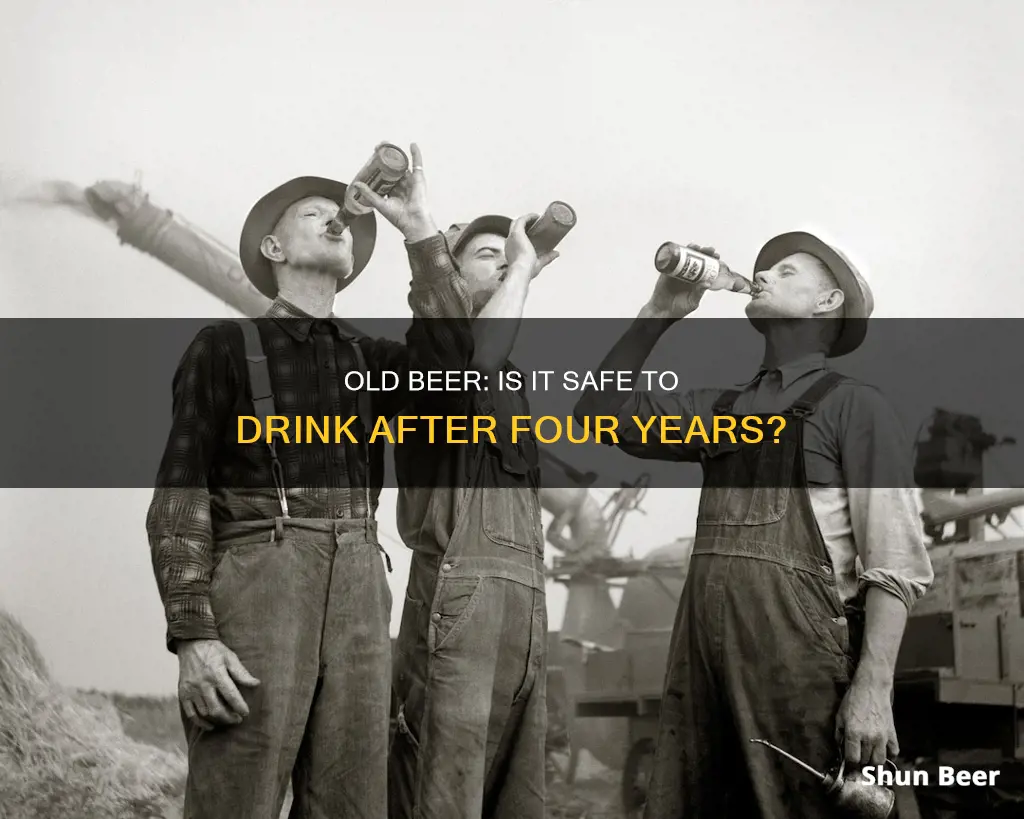
Drinking old beer is a topic of much discussion. While some people claim that drinking very old beer is safe, others advise against it. In this case, the beer in question is four years old, which is not a particularly long time in the context of beer ageing. It is generally accepted that drinking four-year-old beer is safe, but the taste may have deteriorated.
| Characteristics | Values |
|---|---|
| Is it safe to drink? | Yes, it won't make you sick |
| Will it taste good? | Probably not |
| Will it get you drunk? | Maybe, depending on the original ABV |
What You'll Learn

Is 4-year-old beer safe to drink?
It is generally agreed that drinking beer that is past its "best before" date is safe, even if it is four years old. The low pH level of beer means that no known pathogens can survive in it, and the alcohol and hops in beer act as preservatives. This is why beer stays drinkable for much longer than water, and why the Pilgrims survived their journey across the Atlantic.
However, the taste of old beer will be affected. Beers with a high alcohol content, such as craft beers, may acquire richer flavours as they slowly oxidise, and this can be desirable. However, low alcohol beers will taste stale much more quickly, and may take on a "`wet cardboard' flavour.
The way beer is stored will also affect how it tastes over time. Beer that is stored in a cool, dark place, such as a refrigerator, will stay tasting better for longer. Exposure to light can cause beer to "skunk", and clear glass offers no protection against this. Green glass provides some protection, blocking around 40% of light, and brown glass blocks around 90%.
A Beginner's Guide to Joining a Beer Crawl
You may want to see also

Will it taste good?
Whether or not your 4-year-old beer will taste good depends on a few factors. Firstly, the style of beer will have a huge impact on how the flavours develop over time. Light-bodied, low-ABV beers tend to deteriorate faster than darker, high-ABV beers. So, a 10% ABV Imperial Stout will fare better over time than a 4% ABV American Lager.
Secondly, how the beer is packaged is important. Light and oxygen break down the flavours in beer, so canned beer will maintain its taste better than bottled beer over time. Canned beer prevents light from entering and maintains an airtight seal better. Beer bottles that are darker in colour are also better at preventing UV light from reaching the beer and "skunking" it.
Finally, temperature and consistency are key. It is best to keep beer under 50 degrees and in a cool, consistent area or refrigerator. Allowing beer to warm up and cool down multiple times is not good for its flavour.
Based on the above, it is likely that your 4-year-old beer will not taste as good as it once did, but it also depends on the style of beer and how it was packaged and stored.
Beer and Kidney Health: What's the Connection?
You may want to see also

What are the factors that affect the taste of old beer?
It is safe to drink 4-year-old beer, but it probably won't taste good. The taste of old beer depends on several factors.
Firstly, the type of beer matters. High-gravity beers like barley wines or imperial stouts benefit from ageing and acquire richer flavours as they slowly oxidize. Belgian styles, like lambics, also age well as the wild yeasts and bacteria continue to grow. However, even these beers have a limit and will eventually taste stale. Low-gravity beers, on the other hand, begin to taste stale much more quickly.
Secondly, light is the "real enemy" when it comes to beer ageing. Beers stored in clear glass bottles will not be protected from light, whereas green bottles offer some protection, blocking around 40% of light. Brown bottles are the best, blocking about 90% of light. Opaque materials are the most effective at blocking light and preventing skunking.
Additionally, the storage conditions can impact the taste of old beer. Beer that has been stored in a refrigerator will likely taste better than beer that has been exposed to temperature fluctuations.
Finally, the presence of certain chemicals can affect the taste of old beer. For example, the presence of the chemical nonenal, which is also found in aged human body odour, can contribute to the "wet cardboard" taste that is commonly associated with past-due light lagers.
Beer and Sore Throats: Relief or Risk?
You may want to see also

What is the legal drinking age?
While old beer may not be harmful to drink, it is unlikely to taste good. Beer slowly changes over time, and low-gravity beers will taste stale much more quickly.
Now, onto the legal drinking age. The legal drinking age is the minimum age at which a person can legally consume alcoholic beverages. This age varies across the world. The majority of countries have a minimum legal drinking age of 18. Some countries have a minimum legal drinking age of 19, while others, like the United States, have a minimum legal purchasing age of 21. In some countries, the minimum age to consume alcohol in public places is different from the age at which it can be purchased. For example, in England and Wales, the minimum legal age for supervised consumption in private places is five. Some countries also have different age limits for different types of alcoholic drinks.
In North America, the legal drinking age and legal purchase age vary from 18 to 21 years. In Mexico, the drinking age is 18 in all states. In the United States, the minimum legal age to purchase alcoholic beverages is 21 years, with the exceptions of Puerto Rico and the Virgin Islands, where the age is 18. In Canada, most provinces have a minimum age of 19 years, while in Alberta, Manitoba, and Quebec, the minimum age is 18.
In Europe, most countries have set the minimum age to purchase alcohol at 18. However, some countries, such as Austria, Belgium, and Germany, have a minimum purchase age below 18 years. In Switzerland, the minimum age to purchase fermented alcohol (e.g. beer, wine, or cider) is 16, while the minimum age for distilled spirits is 18.
The legal drinking age in Asia varies significantly, with some countries prohibiting alcohol consumption entirely. For example, in Saudi Arabia, drinking or possessing alcohol is prohibited, while in other countries, the legal drinking age can be as high as 21 or 25.
In Africa, the most common minimum age to purchase alcohol is 18. However, some countries, such as Angola and Equatorial Guinea, have no laws restricting the sale of alcohol to minors.
Drinking Beer at Solomon's Island Boat Ramp: Is it Allowed?
You may want to see also

What are the best ways to store old beer?
Beer is best stored in a cool, dark place, with temperatures between 45 and 55 degrees Fahrenheit being optimal. Beer should be stored upright, in a dry place, and away from other foods.
Storing Beer by Container
Kegs should be stored in a cool, dry space, and away from other foods. Do not freeze the kegs as this will alter the taste of the beer. Avoid moving them around too much as this can increase the amount of foam when you tap the keg.
Packaged Beer
Store packaged beer in a dry and cool place, but not in a freezer. Keep bottles upright. You can prolong the shelf life of canned or bottled beer by keeping it just below room temperature or just above typical refrigerator temperatures. If you don't have a way of measuring the temperature, keep your unopened beer in the fridge, where it will remain its best quality for up to eight months. You can also keep unopened cans or bottles at room temperature, where they will stay their best quality for up to six months.
Growlers
The best way to store growlers is upright in a cool, dark space. Once opened, the beer will stay fresh for up to 36 hours.
Home-brewed Beer
Home-brewed beer is more susceptible to the environment than beer from a brewery. You can store it in glass bottles, which are affordable and easy to store, or in kegs, which provide more control over carbonation. During fermentation, store your home-brew somewhere warm so the yeast can get to work, then place it in the fridge so it will be the perfect temperature for drinking.
Storing Beer Long-Term
Beer needs to be stored in a cool, dark place, with the definition of "cool" being between room temperature and freezing. Keep larger containers, like kegs, away from other foodstuffs to reduce any risk of contamination. Always try to store beer containers upright, even if you're aging beer in a cellar.
Temperature Control
Light and heat can quickly accelerate a beer's best-before date, so refrigeration is always a better option than leaving it at room temperature. The cold will help slow down the aging process, and the dark keeps the beer safe from UV rays and heat. If you don't plan to consume your beer for several weeks or months, keeping it in the fridge is the best way to maintain its original taste.
Cellaring Beer
Although beer doesn't usually age like wine, it still needs to be kept in a controlled environment. Keep your beer cellar fairly cool – too warm, and it will accelerate aging and oxidation. Store cellared beer in a dark place where it won't be exposed to direct sunlight. Store your beer somewhere out of the way so you won't need to move it around. Too much movement can cause chemical changes that will affect its overall flavor.
Storing Beer for Aging
Full-bodied, high-ABV beers usually age well in the right conditions. Examples include barleywines, imperial stouts, Belgian strong ales, and lambics. Lighter, hoppier brews like pale ales, IPAs, and wheat beers are not good candidates for cellaring because the hops will break down over time.
Getting Older: Beer and Me
You may want to see also
Frequently asked questions
Yes, it is safe to drink beer that is 4 years old. However, it will not taste good.
The aromatic oils from the hops will break down over time, causing the beer to taste stale.
Beer should be stored in a cool, dark place, like a basement or fridge. Light and fluctuating temperatures can cause the beer to taste bad.
If the beer has lost its carbonation and does not fizz when opened, it has likely gone bad.







